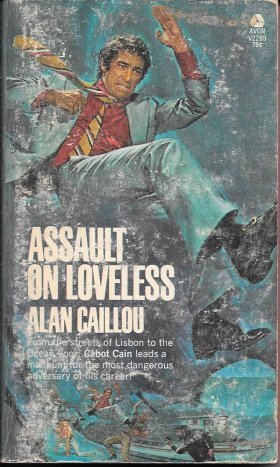“I dunno...I dunno, so help me. He’s got it tucked away somewhere.”
Another tack. I said: “How did you both get here?”
“Boat...from North Africa. We flew to...to Algeria, landed on...on the beach there...took a boat across. Took all day to get the boat...the boat in...That Great Barrier is murder, the Serpent’s Tail...” The incoherence was coming back again, and he was home in Australia, fooling around on the Barrier Reef.
I wondered how long the effect of the drug would last; I know a lot about these things, but I’ve had very little practical experience of them, I’m happy to say.
I said: “All right, you landed from North Africa, when?”
“Two...two months ago.”
“And then?”
“Loveless went off to...to Scotland somewhere. I went to Spain to find...to find Serafino, offer him a job, just like Loveless told me. And Van...Van stayed with the boat. Even there, it’s a bit risky, leaving it...leaving it all that time...”
I said: “Where, Histermann, where’s the boat now?”
But the drug had taken over again. He said, muttering: “That Serpent’s Tail can kill a man, did you know that? When we was kids, out on the Barrier Reef, me and my father used to sail right up to it, we used to watch it, and he used to sail right up to it, we used to watch it, and he used to tell me...”
I said, shaking him back to coherence: “Where do you plan to use that toxin? The botulin?”
“Nigeria, first. Then...anyone who wants us...”
He began to cough horribly, and I got off his chest and let him roll on the floor. His eyes were glassy.
I said: “Why did you have to kill Serafino?” I knew the answer, but I wanted it on the tape.
Histermann shuddered and shook his head, shaking some clarity into it. He whispered:
“God, this is awful...”
I said: “Why, Histermann? Why did you kill Serafino?”
“He knew he was going to make...to make botulin toxin up, in the sour cream...sour cream factory. It was him that told us to buy one.”
“And where did you get the money from? Thirty-five thousand escudos, that’s quite a pile.”
He wiped the tears away from his eyes, staggered up onto the bed, leaned back against the wall and sat there, a piece of wet rag. His eyes were clear now; he was coming round, but not there yet; he had a lot more hallucinations coming on. He said, and he even managed a short sort of laugh, half grunt and half cough:
“The money? We’ve got plenty of money. You’d be surprised...how many people want to support us. In America...in England...in Russia...in China...The left and the right, both sides of the fence, as long as we’re holding out they’re still ready to send us money. Some for this reason, some for that...It’s all very easy, really. You fight for one side, it’s the left wing folks sending you cash. You fight for the other, it’s the right-wingers. We do both, so...so there’s always plenty of money. Easy, ain’t it?”
He was in a state of exhaustion, beyond any care now. He said slowly: “Not sick to my stomach anymore...does that mean...does that mean I’m already dead?”
I said: “How many men with Loveless?”
“Just me and Van, the three of us.”
“Van?”
“The man you saw in the cave, the archer. Van Reck, he’s a South African. Watch out for that bow, he’s murder with it.”
“And how did you propose to use that toxin?”
“We got...three aircraft, small ones. We were going to mix it with flour and...and seed it. From the air.”
I could feel the blood draining out of my face. Four ounces of it? Enough to kill twenty-four million people?
I said harshly: “You know how many people that would kill?”
He shrugged: “Non-people, all of them.” He was too far gone to see my anger. He said: “That’s just...just the kind of weapon we need, ain’t it, digger? Put us back up there where we was before...in the good times...the good times when we was winning...”
I knew it would be hard to control my fury. I signaled the guard and went to the door. As he unlocked it, Histermann, in a sudden fright, threw himself on me and shouted, begging:
“The shot, you’ve got to give me that injection!”
I pushed him away with my foot and left him slavering there on the cell floor. I said: “You’re not going to die, Histermann. Not yet.”
I went out, white with anger, and heard the door being locked behind me. When I looked back through the grill, he was crawling all over the floor, babbling incoherently.
I couldn’t help thinking: there are some people who take that sort of stuff for the fun of it.
CHAPTER 8
Fenrek wasn’t wasting any time.
By the time I was upstairs again he was there waiting for me. He had a police map spread out over the desk and was touching a delicate finger to it:
“There, Rua Vicente, I wonder why he chose that particular place?”

























